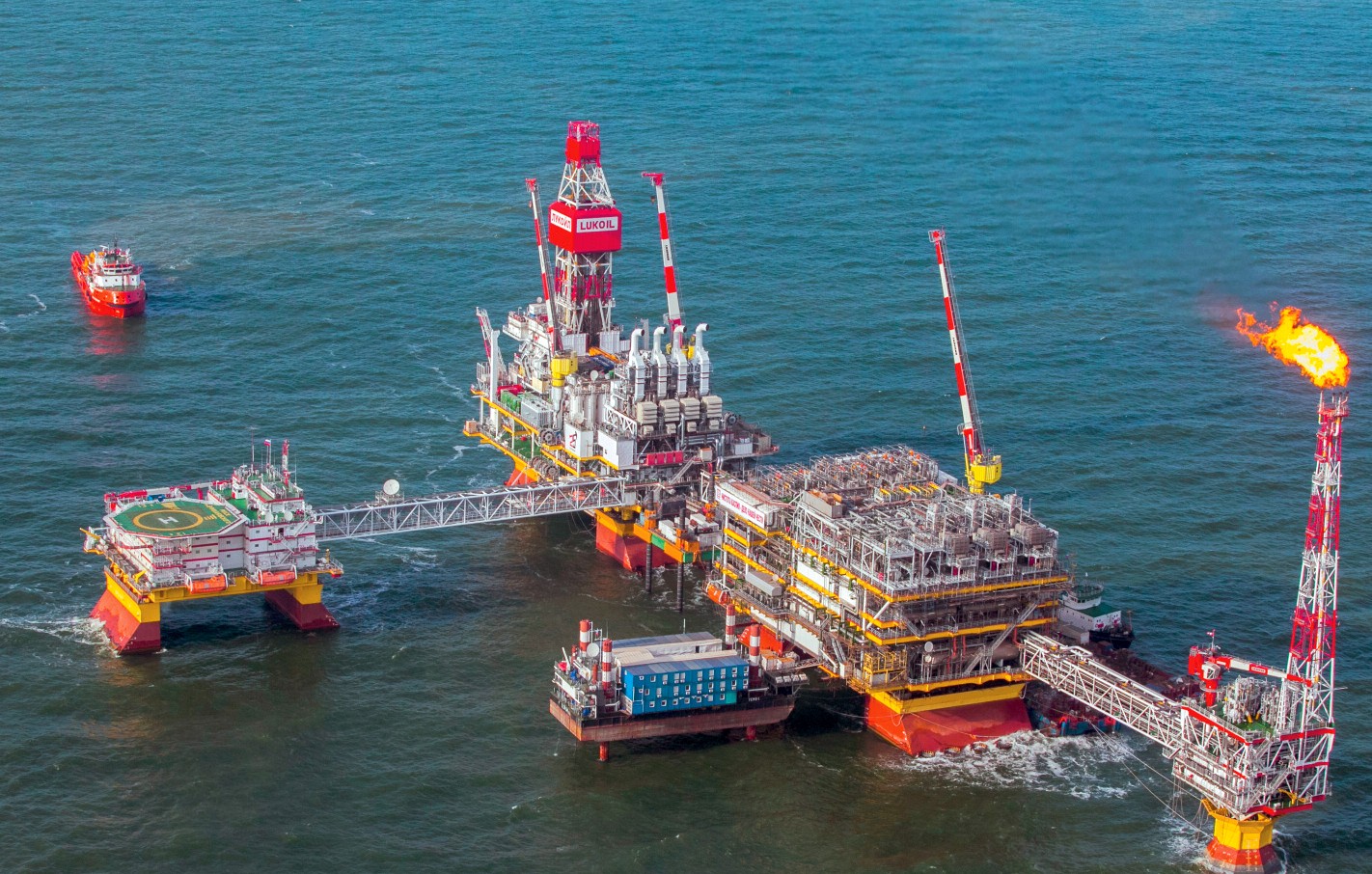Russia’s oil giant Lukoil will help Central Asia’s largest country develop oil fields located in Kazakhstan’s portion of the Caspian Sea.
According to Kazakhstan's Energy Ministry, Kazakhstan’s state-owned KazMunayGas (KMG) and Russia’s Lukoil signed a contract that will see the two entities produce hydrocarbon resources at the Kalamkas-Sea, Khazar and Auezov fields located in Kazakhstan's sector of the Caspian Sea.
“The project calls for the payment of a signing bonus of $32 million, direct investment of more than $6 billion and the creation of about 2,000 jobs in the initial phase of field infrastructure construction," Interfax quoted the ministry as saying on Monday.
As part of a government-led initiative to ease local investment policy Kazakhstan in January adopted a law that would facilitate the introduction of a new mechanism — an improved model contract (IMC) — to boost competition and create conditions for drawing in additional investment in developing Kazakhstan's challenging projects.
Kazakhstan has long been working to increase the country's investment attractiveness by reviewing policies and introducing various benefits for doing business. In 2019, the Kazakh government announced the country’s intent to join the world’s top 30 economies by 2050.
Kalamkas-Sea is an offshore field discovered in 2002 and located in the northeastern part of the Caspian Sea, near the giant Kashagan field — one of the world’s largest discoveries of the past four decades.
In 2013, North Caspian Operating Company N.V. (NCOC) — Kashagan’s operator — announced a commercial discovery at Kalamkas-Sea. Geological reserves at the oil field were reportedly estimated at about 150 million tons of oil and 15 billion cubic meters of gas. However, in 2019, NCOC, including energy giants such as Eni, Shell, ExxonMobil, Total, CNPC, Inpex, and KazMunayGas, all pulled out of the Kalamkas-Sea project.
Discovered in 2007, Khazar is also located next to the Kashagan field. The Caspi Meruerty Operating Company BV operates Khazar under a production sharing agreement, which includes KazMunayGas and Oman Pearls Company Limited. In 2019, the British-Dutch oil and gas conglomerate Shell scaled back its oil and gas exploration plans for Khazar due to “the low profitability of these projects against the background of high capital expenditures.” Before the withdrawal, Shell had invested about $900 million in the project.
The oil and gas industries are the main pillars for Moscow and Astana as both Russia and Kazakhstan are flush with hydrocarbons. The two post-Soviet countries have maintained strong partnerships in the energy sector through already existing close economic, technological and transportation initiatives.
The project in Kazakhstan will not be a first for Lukoil, which has been involved there since 1995.
Together with Rosneft, the company has been responsible for exploring the Tengiz oil and gas field, which ranks as the world’s deepest supergiant oil field. In addition, Lukoil is responsible for exploring the Karachaganak (13.5 percent) and Zhenis block (50 percent). Reportedly, Lukoil is planning to invest about $350 million in exploration at the Zhenis block over the next seven to nine years.
In 2021, Lukoil signed a sales and purchase (SPA) agreement with KazMunayGas to acquire a 49.99 percent stake in the charter capital of Al-Farabi Operating LLP, a joint venture to develop an offshore block located in Kazakhstan’s portion of the Caspian Sea. According to Lukoil’s data, recoverable resources at the Al-Farabi block are estimated at 15.1 million tons.
Lukoil is also a member of the Caspian Pipeline Consortium, through which the crude oil is transported.







 Armenian sappers commenced on Monday mine-clearance operations in the territories adjacent to the Saint Mary Church in village of Voskepar (Armenia...
Armenian sappers commenced on Monday mine-clearance operations in the territories adjacent to the Saint Mary Church in village of Voskepar (Armenia...
 Russian Foreign Minister Sergei Lavrov has reasserted that Moscow has no intentions to stop the fighting in Ukraine, even if peace talks commence.
Russian Foreign Minister Sergei Lavrov has reasserted that Moscow has no intentions to stop the fighting in Ukraine, even if peace talks commence.
 Iran has refuted reports of alleged damage to Shimon Peres Negev Nuclear Research Centre located southeast of Dimona, Israel, during the recent air...
Iran has refuted reports of alleged damage to Shimon Peres Negev Nuclear Research Centre located southeast of Dimona, Israel, during the recent air...
 Iran’s Foreign Minister, Hossein Amir-Abdollahian, has labeled a foiled Israeli drone attack in certain parts of the country as a "failure" for Isr...
Iran’s Foreign Minister, Hossein Amir-Abdollahian, has labeled a foiled Israeli drone attack in certain parts of the country as a "failure" for Isr...



